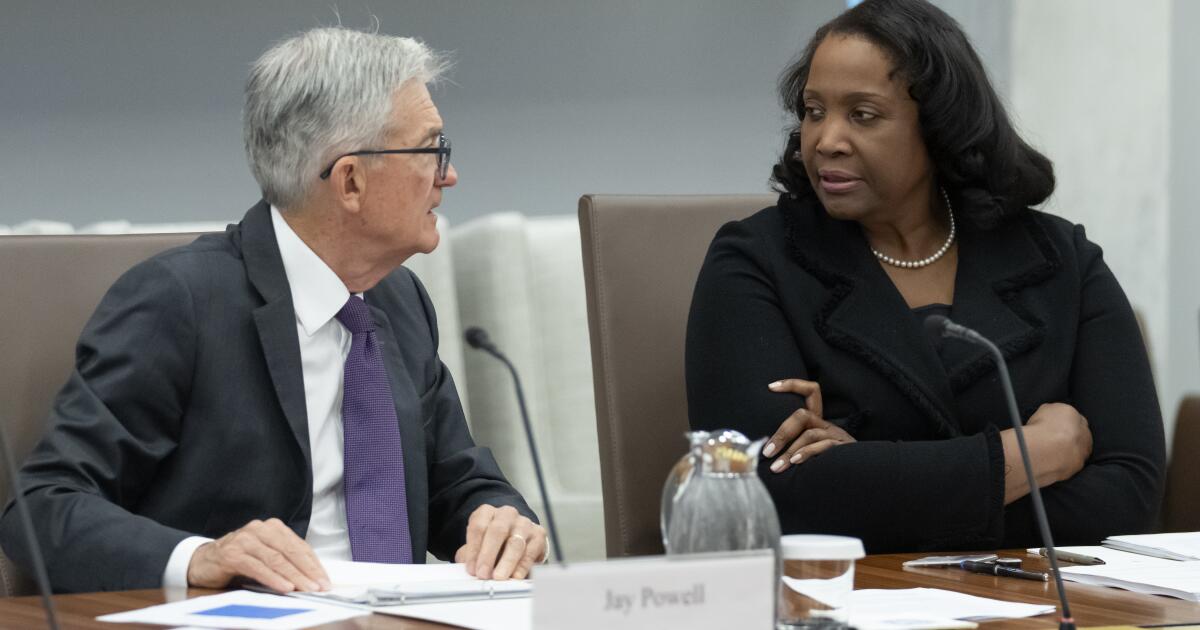Supreme Court wary of Trump’s bid to fire Fed governor Lisa Cook
WASHINGTON — The Supreme Court gave a skeptical hearing Wednesday to President Trump’s claim that he has the power, acting alone, to fire Federal Reserve Board governor Lisa Cook for a past mistake on a mortgage application.
Most of the justices said they were not convinced that what Chief Justice John G. Roberts Jr. described as Cook’s “inadvertent mistake” was grounds for removing her from the central bank board.
They also questioned Trump’s failure to give her a hearing.
Justice Brett M. Kavanaugh told Trump’s lawyer he had overplayed his hand.
“Your position is that there’s no judicial review, no process required, no remedy available and a very low bar for cause that the president alone determines,” he told Trump’s Solicitor Gen. D. John Sauer. “That would weaken, if not shatter, the independence of the Federal Reserve.”
“Why are you afraid of a hearing?” asked Justice Amy Coney Barrett. “If you have the evidence … give her a chance to defend herself. That just wouldn’t be that big of a deal.”
Trump has sought to take control of the independent bank board because it has not lowered interest rates as far and as fast as he prefers.
He has clashed with Federal Reserve Board Chairman Jerome H. Powell and threatened to fire him. More recently, Trump’s prosecutors said they were investigating Powell for possible criminal false statements in a congressional hearing.
In August, Trump posted on social media that he had “cause” to fire Cook after he was told she may have committed mortgage fraud.
In 2021, the year before President Biden appointed her, she bought homes in Michigan and Georgia and said each would be her “principal residence.”
In response to the allegation, Cook’s attorney said she had told the mortgage lender that the Georgia property was a “vacation home,” not her primary residence.
Cook sued to retain her seat. A federal judge blocked her removal on the grounds that her alleged wrongdoing came before her appointment. The D.C. Circuit Court agreed in a 2-1 decision.
In September, Trump’s lawyers sent an emergency appeal to the Supreme Court and said this was “yet another case of improper judicial interference with the president’s removal authority.” They said the court should set aside the lower court ruling and uphold Cook’s firing.
For much of the past year, the court’s conservatives have granted appeals from Trump’s lawyers and allowed the president to fire agency officials who had fixed terms in office.
Last month, they were ready to overturn a 90-year-old precedent and to rule that Trump has the “executive power” to remove and replace these officials.
But Roberts and the conservatives were also ready to make an exception for the Federal Reserve Board. They suggested the central bank is not an executive agency subject to the president’s direct control.
In October, they opted to keep Cook’s firing on hold, and they scheduled arguments on how to proceed.
But Roberts agreed with Kavanaugh that Trump’s lawyers had gone too far.
“You began by talking about deceit,” he told Sauer. “Does what you said apply in the case of an inadvertent mistake contradicted by other documents in the record? Under your position, it doesn’t make a difference, right?”
Sauer had argued the courts could not review Trump’s decision to fire a Federal Reserve Board governor.
Kavanaugh, a former White House lawyer, said Trump’s position would destroy the independence of the Federal Reserve, which had been supported by both parties.
“What goes around comes around,” he said. “All of the current president’s appointees would likely be removed for cause on Jan. 20, 2029, if there’s a Democratic president. … Then we’re really at at-will removal. So what are we doing here?”
While the justices were skeptical of Trump’s arguments on Wednesday, it was not clear how they will rule.
They could rule that Trump has to give Cook a hearing and an opportunity to defend herself. Or they could rule more directly and say that an alleged misstatement on a past mortgage application did not rise to the level of “cause” for firing a Federal Reserve Board governor.
Representing Cook, Washington attorney Paul Clement, a former U.S. solicitor general under President George W. Bush, said the court should preserve the Federal Reserve as a unique and independent agency.
“There is an unbroken history going back to its founding in 1913 in which no president, from Woodrow Wilson to Joseph Biden, has ever even tried to remove a governor for cause, despite the ever-present temptation for lower rates and easier money,” he said.
He argued that the independence of the Federal Reserve is more important than resolving the allegations against Cook.
“It’s less important that the president have full faith in every single governor, and it’s more important that the markets and the public have faith in the independence of the Fed from the president and from Congress,” he said.
